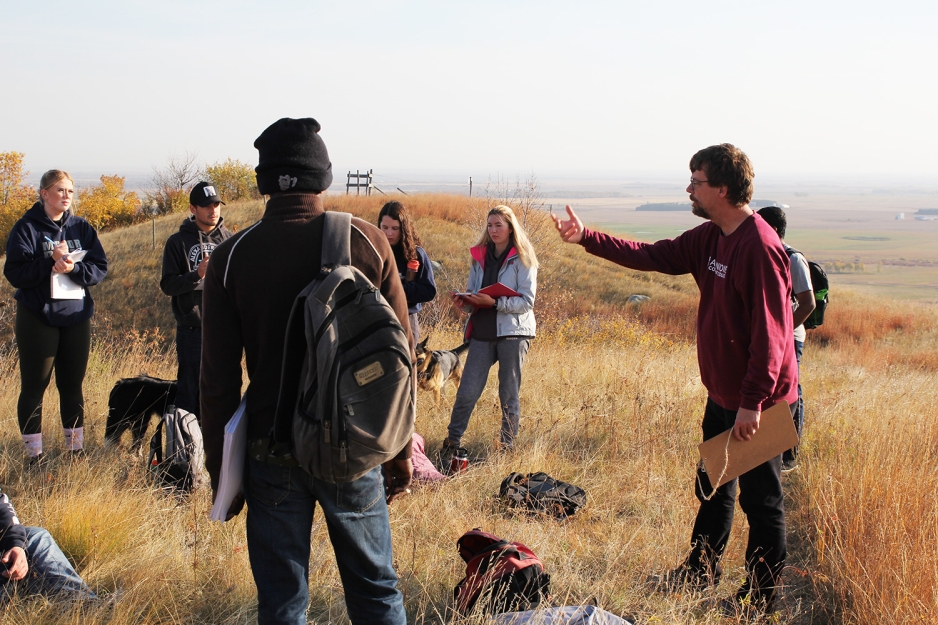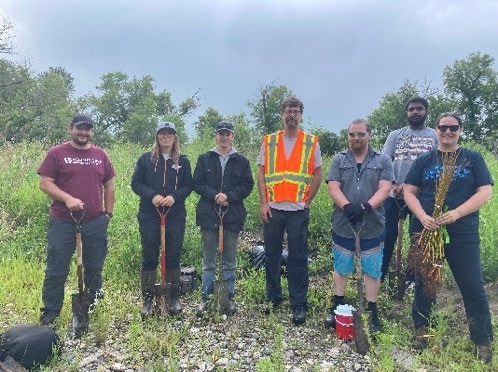James Hood BSc, MNRM
Biography
James Hood is a Faculty Researcher for the Russ Edwards School - Agriculture & Environment at Assiniboine. With a career spanning nearly a decade at the college, he has become a vital part of the institution, contributing to various programs and shaping the future of environmental education.
James was born in Winnipeg but found his roots in the Swan River Valley during his junior high and high school years. Graduating with a Bachelor of Science in biology from the University of Winnipeg, he pursued his passion for the environment, eventually earning a Master's degree in Natural Resources Management from the University of Manitoba.

James's post-university journey led him to diverse roles that enriched his understanding of environmental issues. He spent time as an environmental consultant in Winnipeg, where he collaborated with Manitoba Hydro and Indigenous communities. Later, he joined Manitoba Agriculture's Agri Environment branch, which introduced him to Brandon for the first time.
After a stint in Brandon, James went on to an opportunity in Regina, working for the province of Saskatchewan. His role involved watershed planning where he played a significant role in coordinating a watershed planning team, which assisted governments and communities in making locally appropriate land and water management decisions, primarily in the Lower Qu'Appelle river region between Regina and the Manitoba border. The impact of his work there continues to be felt, as the group he helped form remains operational.
James's focus now lies in teaching, particularly through field work where students can directly experience and apply their knowledge. Under James's guidance, Assiniboine's environmental programs have thrived and evolved, providing students with exceptional learning opportunities. With Manitoba's abundance of lakes and rivers, aquatic lessons have become a core part of the curriculum.
Research Focus
- Agricultural Extension
- Watershed Planning
- Source Water Protection
- Manure and Nutrient Management
- Riparian Assessments
- Conservation Restoration
Most Significant Contributions:
- Developed and completed the Lower Qu’Appelle River Watershed plan for the Water Security Agency of Saskatchewan (WAS)
- This included a plan for source water protection for the Cowessess First Nation. It was the first time that the Nation had participated as an equal partner in the development of a watershed plan. The individual responsible for the leadership, facilitation, and overall coordination of several watershed committees and stakeholders to develop the watershed plan, an education rollout, and capacity building for plan implementation. The finalized plan was released on July 12, 2013, and is still in use today.
- Managing the Water's Edge - Riparian Health Assessment for Streams and Small Rivers-Manitoba Forestry Association.
- Developed the Riparian Essentials presentation and education materials for the workbook Managing the Water's Edge - Riparian Health Assessment for Streams and Small Rivers - Manitoba Forestry Association. This workbook was written for those who can most effectively influence riparian areas with their management - landowners, livestock producers, farmers, agency staff, and others. It offers a way to systematically assess riparian areas in a consistent manner as well as provide general riparian-related information. The workbook was tailored for Manitoba but has been modified for use by other groups across Canada.
- Assiniboine Community College Land & Water Diploma program Environmental Capstone applied research curriculum.
- Updated and implemented the Assiniboine Community College Land & Water Diploma program Environmental Capstone applied research curriculum. The coursework provides students with the opportunity to structure and research an environmental project and determine scope, time, stakeholders, costs, and risks. Students practice environmental management by integrating learned skills, incorporating available concepts and tools, linking environmental issues with strategies, product and service development, and involving public and external industry partners.
- Establishment of Lower Qu’Appelle Watershed Stewards (LQWS) watershed committees.
- Established the Lower Qu’Appelle Watershed Stewards (LQWS) watershed committees and facilitated the hiring and training of the first Watershed Coordinator for the group. The LQWS is an independent, non-profit organization committed to protecting water sources in the Lower Qu’Appelle River Watershed. The Stewards are responsible for the management and implementation of the Lower Qu’Appelle River Watershed plan.
Projects
Ongoing Projects:
- Environmental DNA (eDNA) Collection for Wild Pig Surveillance in Manitoba. Funded by Squeal on Pigs, Manitoba Pork, and NSERC Mobilize. In partnership with Squeal on Pigs Manitoba, Bioscision Diagnostics, and Manitoba Pork.
- Manitoba is the country's largest pig producer, with a $4.96 billion pork export market. The spread of African Swine Fever poses a significant risk, potentially shutting down this industry. Wild pigs in the region cause damage to natural habitats, displace wildlife, and harm crops, resulting in economic losses. Currently, wild pig surveillance in Manitoba relies on reported sightings. To improve this, a project is testing a USDA environmental DNA (eDNA) water assay protocol to map and track wild pig locations. The presence of eDNA in water sources can indicate the proximity of wild pigs, offering a more efficient means of monitoring their presence.
- Brook Trout Habitat Restoration (Stony Creek, MB). Funded by NSERC Mobilize 2023-2025. With Manitoba Fisheries and the Whitemud Watershed.

Stony Creek, located in Manitoba's Whitemud Watershed District, historically supported brook trout spawning, attracting anglers. However, a decline in fish population occurred due to massive flooding in July 2020, which damaged trout habitats and altered the stream channel. To address this, a habitat restoration plan was developed by a recent graduate of the Land & Water Management program. The project aims to increase brook trout population by 3% in a specific segment of Stony Creek, evaluate restoration options for other creek parts, and provide evidence-based recommendations for spawning habitat restoration in different locations.
In June 2023, James Hood and a team of students, faculty, and industry professionals initiated river bank restoration work. They planted approximately 675 trees along the banks of Stony Creek, with 600 Golden Willow trees near the stream at Site B to encourage natural regeneration in non-vegetated areas. Additionally, 75 Oakanese Poplar trees were planted in upslope areas at Site B.
- Living Laboratory (Stony Creek, MB).
- The Case for Bison Farming to Restore and Protect Native Prairies
- An education guide for current and future bison producers on the importance of prairie restoration and bison for their ecological and historic importance to native prairies.
- Strategy for Leafy Spurge control on the Southern reach of the ACC North Hill Campus Creek.
- An integrated weed management strategy to control leafy spurge (Euphorbia esula) on the ACC North Hill campus; includes distribution maps and control options.
- Prairie Sage: Traditional and Conservation Practices.
- A guide to the growing prairie sage in private gardens and the purchase from reputable sources that practice sustainable harvesting, to reduce the demand for wild-harvested sage, protect its natural habitats and reduce cultural appropriation.
- r(e-cycling)@ACC Electronic Waste Diversion Drive.
- A project plan to promote the recycling of electronic waste in the Assiniboine Community College campus community. The pilot diverted 110 kg of e-waste from the landfill.
- Buffer Zones for Field Runoff Control.
- Recommendations for developing buffer zones for field runoff control in the Souris River Watershed District. Includes two plans outlining species blends and buffer locations.
- Mapping the Spread of Whirling Disease (Myxobolus Cerebralis).
- Providing Parks Canada with the Information to Educate the Public of Spread and Prevention in Riding Mountain National Park. Developed an ArcGIS story map detailing the spread of whirling disease, and how to prevent the spread.
- Erecting educations signs for the Canupawakpa walking trail, Metigoshe natural area and Sweetgrass Meadow walking trails in the Souris River Watershed District.
- Created and placed educational signs on 3 walking trails in the Souris River Watershed District (SRWD).
Applications:
- James Hood (Research Team - Principal Investigator), Testing of environmental DNA surveillance methodology for wild pigs in Manitoba (2023).
- Canada’s (CAN) pigs/pork export market is worth $4.82B (2022), and would immediately be at risk if African Swine Fever (ASF) was introduced. As CAN’s 3rd largest pork producer, MB is at risk with a wild pig population that would spread ASF, other diseases; damage natural habitats and uproot crops. Surveillance methodologies are needed to accurately determine wild pig locations. The team will test/refine the USDA environmental DNA (eDNA) water assay to determine where wild pigs are or are not.
Courses Taught
- Aquatic Ecosystems ENVR-0044-LWM01
- College Foundations PEDV-0356-AGB02
- College Foundations PEDV-0356-LWM01
- Environmental Capstone 1 ENVR-0047-LWM02
- Environmental Capstone 2 ENVR-0048-LWM02
- Environmental Land Management ENVR-0038-AGA01
- Environmental Land Management ENVR-0038-AGB04
- Environmental Land Management ENVR-0038-AGB05
- Environmental Legislation ENVR-0042-LWM02
- Natural Resources Field Lab AGRC-0292-LWM02
Recent Publications
- Hood J. (1997). Thesis: “Expert systems for environmental self-assessment :a case study of Manitoba hydro sub-transmission lines, 66kv, in the rural municipality of Whitemouth.”
Extension:
- Environmental Farm Planning presentations to farmers and agriculture professionals.
- Manure and Nutrient Management training workshops for farmers and agriculture professionals.
- Riparian Field Assessment workshops across Manitoba for land owners, agriculture professionals and government staff.
Awards & Honours
2023: Excellence in Teaching Award by ACC for extraordinary contributions to student excellence.
Contact info:
Russ Edwards School of Agriculture and Environment
Assiniboine College
1430 Victoria Ave E,
Brandon, MB
R7A 2A9
Room 434
[email protected]
204-725-8700 Ext. 7116

